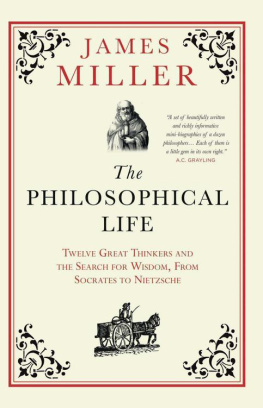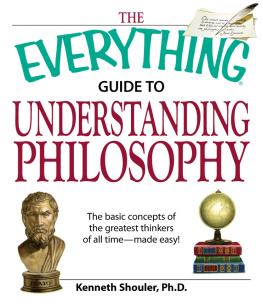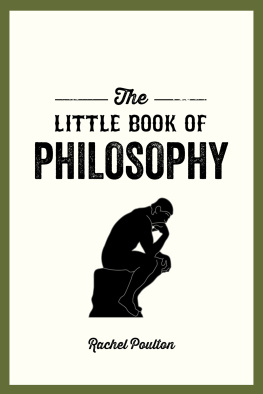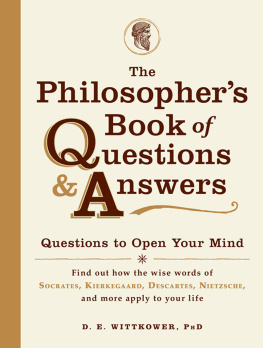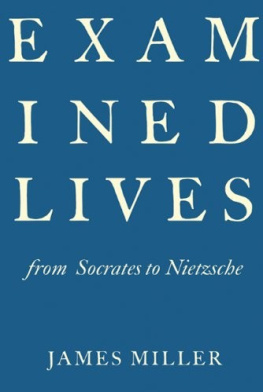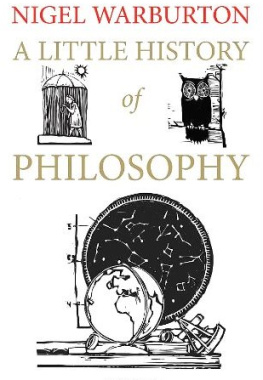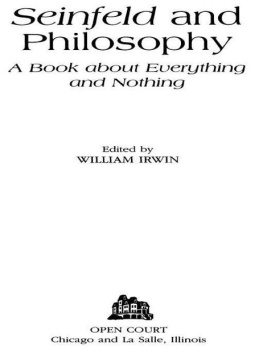THE PHILOSOPHICAL LIFE
ALSO BY JAMES MILLER

Flowers in the Dustbin: The Rise of Rock and Roll, 19471977
The Passion of Michel Foucault
Democracy Is in the Streets: From Port Huron to the Siege of Chicago
Rousseau: Dreamer of Democracy
History and Human Existence: From Marx to Merleau-Ponty

A Oneworld Book
First Published in Great Britain and the Commonwealth by
Oneworld Publications 2012
This ebook edition published in 2012
Copyright James Miller, 2011
Originally published in the United States of America as Examined Lives by Farrar, Straus and Giroux
The moral right of James Miller to be identified as the
Author of this work has been asserted by him in accordance with the Copyright, Designs, and Patents Act 1988
All rights reserved
Copyright under Berne Convention
A CIP record for this title is available from the British Library
ISBN: 978-1-85168-859-3
Ebook ISBN 978-1-85168-867-8
Cover design by Richard Green
Oneworld Publications
185 Banbury Road
Oxford OX2 7AR
England
Learn more about Oneworld. Join our mailing list to find out about our latest titles and special offers at: www.oneworld-publications.com
FOR RUTH
CONTENTS

THE PHILOSOPHICAL LIFE
PREFACE
Of all those who start out on philosophynot those who take it up for the sake of getting educated when they are young and then drop it, but those who linger in it for a longer timemost become quite queer, not to say completely vicious; while the ones who seem perfectly decent... become useless
PLATO , Republic (487cd)

O nce upon a time, philosophers were figures of wonder. They were sometimes objects of derision and the butt of jokes, but they were more often a source of shared inspiration, offering, through words and deeds, models of wisdom, patterns of conduct and, for those who took them seriously, examples to be emulated. Stories about the great philosophers long played a formative role in the culture of the West. For Roman writers such as Cicero, Seneca, and Marcus Aurelius, one way to measure spiritual progress was to compare ones conduct with that of Socrates, whom they all considered a paragon of perfect virtue. Sixteen hundred years later, John Stuart Mill (18061873) similarly learned classical Greek at a tender age in order to read the Lives of the Eminent Philosophers , as retold by Diogenes Laertius, a Greek follower of Epicurus who is thought to have lived in the third century A . D .
Today, by contrast, most highly educated people, even professional philosophers, know nothing about either Diogenes Laertius or the vast majority of the ancient philosophers whose lives he recounted. In many schools in many countries, the classical curriculum has been largely abandoned. Modern textbooks generally scant the lives of philosophers, reinforcing the contemporary perception that philosophy is best understood as a purely technical discipline, revolving around specialized issues in semantics and logic.
The typical modern philosopherthe Kant of the Critique of Pure Reason (1781), say, or the John Rawls of A Theory of Justice (1971)is largely identified with his books. It is generally assumed that philosophy refers to the study of the most general and abstract features of the world and the categories with which we think: mind, matter, reason, proof, truth etc., to quote the definition offered by the outstanding recent Oxford Dictionary of Philosophy . In the modern university, where both Kant and Rawls practiced their calling, aspiring philosophers are routinely taught, among other things, that the value of a theory should be evaluated independently of anything we may know about the person holding that theory.
Such a principled disregard of any evidence about philosophers lives is a characteristically modern prejudice. For most Greek and Roman thinkers from Plato to Augustine, theorizing was but one way of living life philosophically. To Socrates and the countless classical philosophers who tried to follow in his footsteps, the primary point was not to prove a certain set of statements (even when the ability to define terms and analyze arguments was a constitutive component of a schools teaching), but rather to explore the kind of person, the sort of self that one could become as a result of taking the quest for wisdom seriously.
Or, as Socrates puts it in the pages of Xenophons Memorabilia , If I dont reveal my views in a formal account, I do so by my conduct. Dont you think that actions are more reliable evidence than words?
In ancient Greece and Rome, it was widely assumed that the life of a philosopher would exemplify a specific code of conduct and form of life. As a result, biographical details were routinely cited in appraisals of a philosophys value. That Socrates faced death with dignity, for example, was widely regarded as an argument in favor of his declared views on the conduct of life.
The transition from ancient to modern modes of living life philosophically was neither sudden nor abrupt. Writing a generation after Montaigne, Descartes (15961650) could still imagine commissioning a kind of mythic biography of himself, whereas, fewer than two hundred years later, Rousseau (17121778) can only imagine composing an autobiography that is abjectly honest as well as verifiably true in its most damning particulars. It should come as no surprise, then, that so many modern philosophers, though still inspired by an older ideal of philosophy as a way of life, have sought refuge, like Kant, in impersonal modes of theorizing and teaching.
This sort of academic philosophizing notoriously left Friedrich Nietzsche cold. I for one prefer reading Diogenes Laertius, he wrote in 1874. The only critique of a philosophy that is possible and that proves something, namely trying to see whether one can live in accordance with it, has never been taught at universities; all that has ever been taught is a critique of words by means of other words.
A century later, Michel Foucault (19261984) expressed a similar view. In the winter of 1984, several months before his death, Foucault devoted his last series of lectures at the Collge de France to the topic of parrhesia, or frank speech, in classical antiquity. Contemplating, as Nietzsche had a century before, possible antecedents for his own peculiar approach to truthfulness, Foucault examined the life of Socrates and, using evidence gathered by Diogenes Laertius, the far odder life of Diogenes of Sinope (d. c. 320 B . C .), the archetypal Cynic, who was storied in antiquity for living in a tub, carrying a lit lamp in broad daylight, and telling anybody who asked that I am looking for a man.
Foucault of course knew that the lore surrounding a philosopher like Diogenes was no longer taken seriously. But he, like Nietzsche, decried what he called our modern negligence of what he called the problem of the philosophical life. This problem, he speculated, had become eclipsed for two reasons: first, because religious institutions, above all Christian monasticism, had absorbed, or (in his words) confiscated the theme of the practice of the true life. And, second, because the relationship to truth can now be made valid and manifest only in the form of scientific knowledge.
The twelve biographical sketches of selected philosophers from Socrates to Nietzsche that follow are meant to explore these issues by writing, as Foucault suggested, a history starting from the problem of the philosophical life. Instead of recounting one life in detail, I recount a number of lives in brief. Anecdotes and human incident flesh out the philosopher under discussion. Distinctive theories and doctrines are summarized concisely, even though their nuances and complexities often puzzle philosophers to this day. And following the example of such ancient biographers as Plutarch in his Lives of the Noble Greeks and Romans , I am highly selective, in an effort to sum up the crux of a character. My aim throughout is to convey the arc of a life rather than a collection of doctrines and moral maxims.
Next page
